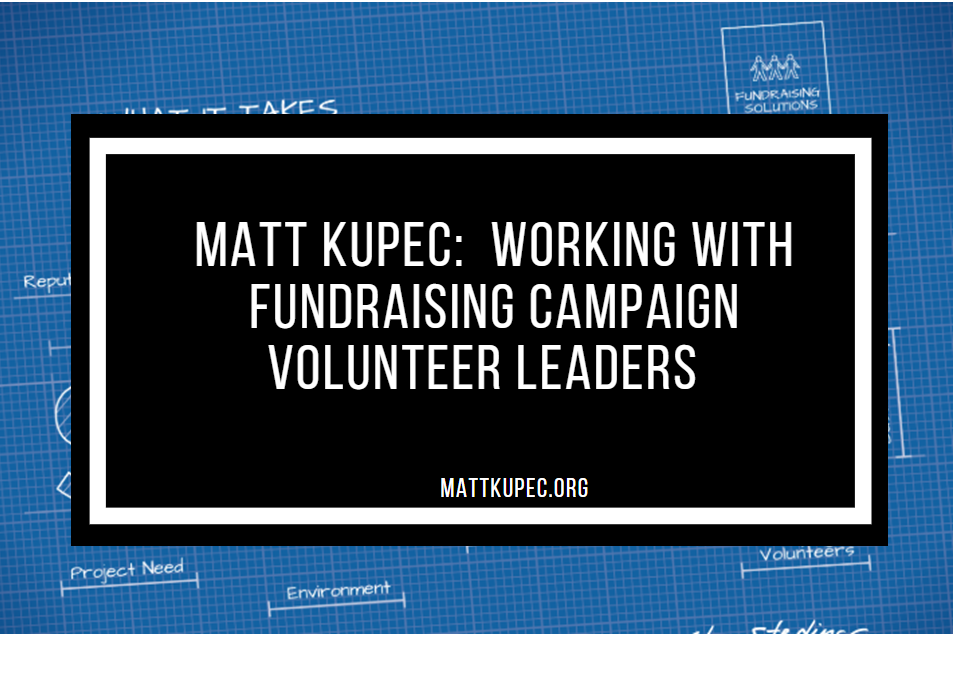by Matt Kupec
October 30, 2019
It seems like every non-profit and educational institution is in the midst of a major fundraising campaign! Campaigns are so frequently launched that it now feels like it is more the norm to be in a campaign than not to be in a campaign.
I have had the chance to lead four major fundraising campaigns:
- “The Campaign for Hofstra University,” a $30 million effort that was Hofstra University’s first-ever comprehensive campaign. That initiative raised $32 million in total.
- “The Bicentennial Campaign” at the University of North Carolina in Chapel Hill, a $320 million effort that was launched on the celebration of UNC’s 200th That campaign raised $440 million in total.
- “The Carolina First Campaign,” a $1.8 billion campaign launched by UNC-Chapel Hill. This effort wound up totaling $2.38 billion in commitments, at the time the 5th largest campaign by a University in U.S. history.
- “Forever SIU Campaign,” a $75 million effort launched by Southern Illinois University Carbondale. This effort is nearing the $90 million mark in commitments as the campaign marches on.
Having run four major fundraising campaigns, I know the important role that volunteer leadership can play in the subsequent success or failure of these important fundraising initiatives. In this blog post, I share my thoughts about successfully working with volunteer leaders in a campaign:
Recruiting Volunteer Campaign Leaders. Finding the right mix of individuals to serve as volunteer leaders of your campaign is one of the most important decisions an organization can make. I’ve had the privilege of working with some giants like Hugh McColl, Billy Armfield, Paul Fulton, Charlie Shaffer, Mike Overlock, Barbara Hyde and Mary Ann Dickson in the two UNC campaigns. SIU has a star in Dan Korte and if the campaign gets extended additional great leaders will join the SIU effort.
But what do you look for when recruiting campaign chair(s)? Do you need just one chair? Maybe co-chairs? How about multiple chairs? There are number of factors you should consider when recruiting volunteer leaders. How passionate are the individuals about your organization? Are they major donors? If not, does that matter? Are they connected? Do other volunteers respect them? What about the proper balance of your leadership group in terms of gender, race, and age?
These are all important questions to ask when recruiting leadership for the campaign. Remember, you will be working very closely with these individuals for the duration of the campaign so it is important that you select the right people to lead your campaign.
Roles and Responsibilities for Campaign Leaders. A volunteer leader “job description” should be written. It is really important to have a clear understanding of the expectations for the role the campaign chairs should play as you plan, launch and execute the campaign plan. Here is an example of a campaign chair “job description:”
Overview – Campaign Chair Job Description
Provide advice and counsel to professional staff and participate in raising funds to meet the established campaign goals
Expectations
- Commitment to the vision, mission, and goals of your organization.
- Willingness to make a campaign contribution.
- Willingness to solicit others
Primary Roles and Responsibilities
- Serve as the champion for the campaign.
- Provide input into development of the school/unit campaign committee strategy and goals.
- Work with President and fundraising leadership to engage in the execution of all aspects of the fundraising campaign, including marketing efforts, personal solicitation, and the acknowledgement process.
- Participate in various campaign-related events.
- Help to identify new prospects and potential funders.
- Celebrate team and campaign success.
Other Commitments
- Lead the national campaign committee meetings.
- Allocation of time – approximately 4-6 hours per month – to meet with or contact donors or prospects.
- Costs associated with participating in fundraising events will be the responsibility of the volunteer committee member.
Working with Campaign Leaders During a Campaign. Effective communication with the campaign chairs during a campaign is a must! It is so important for you to keep the leaders aware of successes and important and emerging details of the campaign are critical in making sure the chairs are playing an active role in the life of the campaign.
I recommend regular briefing types of meetings, maybe monthly, but at least, quarterly. Create campaign summary reports to share with the chairs on a regular basis. Have strategy review sessions. Engage the President of your organization in some of these discussions. But, regularly communicate and keep the chairs informed. It takes a concerted effort on your part but it will be worth the effort. Great chairs will play a huge role in the overall success of your campaign so keep them engaged and aware of campaign developments throughout the entire initiative.

